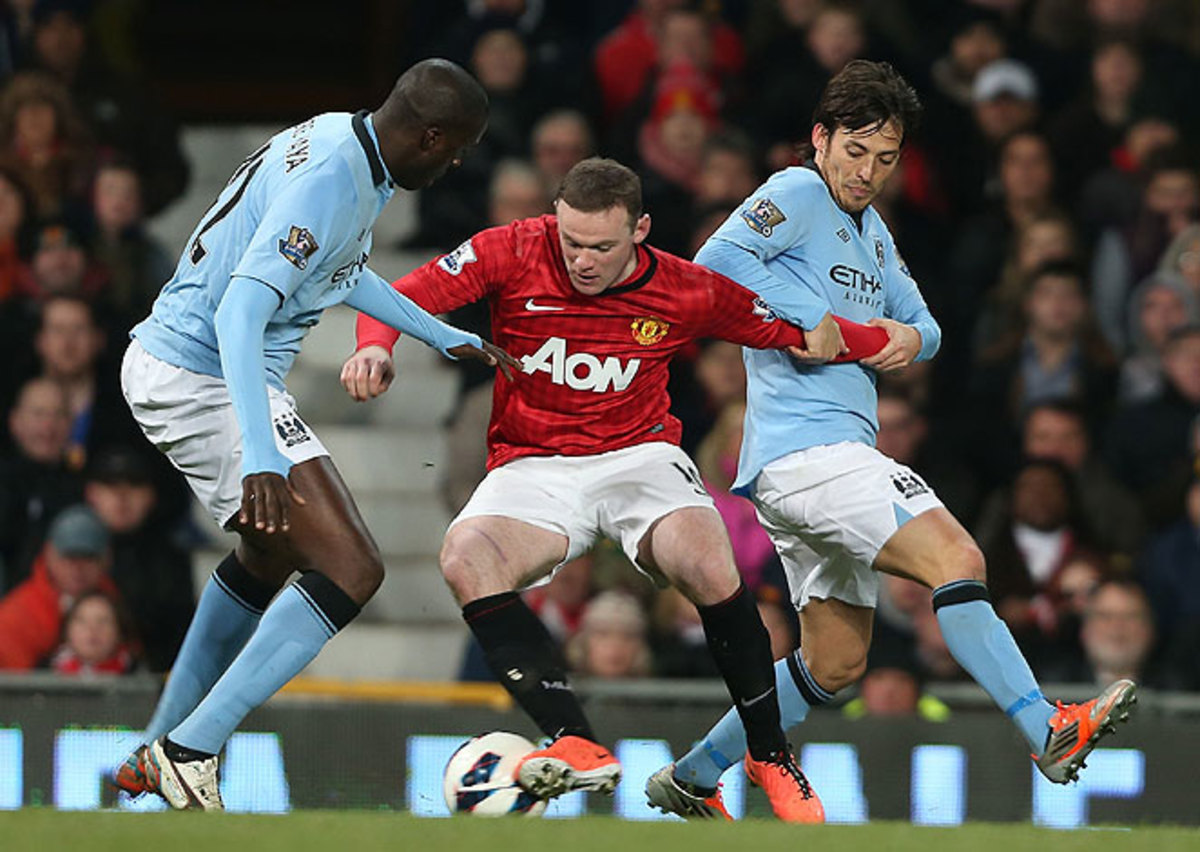Man City has formula for countering powerful Manchester United

Wayne Rooney (center) was largely largely ineffective against a powerful Manchester City midfield.
Matthew Peters/Getty Images
Even if Manchester City wins its seven remaining games this season, Manchester United needs only to take 10 points from its last seven games to clinch a 20th league title. As Roberto Mancini said, "It's finished." And yet for all that, there is a strange feeling of City ending the season on a high after winning the Manchester derby 2-1, while United has questions to answer. In a sense, the league this season has almost been so easy for United that it's hard for it to derive any great satisfaction from its (almost certain) success.
There will be changes at City -- that much is certain. They may or may not include the manager but they will certainly include three or four major signings and a number of departures. But there needs also to be investment at United: defeat in the derby comes after two games against Chelsea and two games against Real Madrid in the past month that it has failed to win. Against lesser sides the lack of dynamism in midfield seems not to matter; against better teams, though, United is left exposed, the potency of its attacking options nullified by the lack of control.
The derby was an exhausting, breathless game that developed much as games between the two have over the past two years. City, partly because of personnel and partly because of shape, is stronger through the center of midfield: Michael Carrick and Ryan Giggs, operating at the back of midfield, simply cannot cope with the trio of Gareth Barry, Yaya Toure and David Silva. Although Wayne Rooney, dropping off Robin van Persie, adds something to United's midfield -- and his ball-winning capacity was badly missed in the game at the Etihad last April when he played as a lone center-forward -- that is more than compensated for by the way Samir Nasri and -- to a lesser extent -- James Milner tuck in. Rooney disappointed anyway, perhaps rusty after a fortnight out with a groin injury.
City had more men and is physically more imposing in midfield, and that enabled it to control possession. United, as it did at the Etihad earlier in the season and as it has in all three games against Chelsea this season -- matches in which it finds itself at a similar disadvantage in central areas -- looked to counter by playing on the break and getting the ball wide as often as possible. City's width is provided by the fullbacks and that means it can be vulnerable to balls played into the areas behind Pablo Zabaleta or Gael Clichy, something that is compounded by Nasri's reluctance to track (although Milner's tireless running provides some sort of counterbalance on the other flank).
United's other advantage is from set plays. It may lack physical presence in the center of midfield but in other areas it dwarfs City, particularly when Edin Dzeko is left on the bench. Add in Van Persie's superlative positioning and it means United will always threaten from free kicks and corners, something that has been a feature of this season. It was a Van Persie free kick that won the game at the Etihad and it was his free kick that brought the equalizer at Old Trafford, as Phil Jones mistimed his leap and headed his delivery away from goal only to get lucky when the ball struck Vincent Kompany on the back and ricocheted in.
City had taken the lead with a goal that encapsulated what it had done best in the game, even if it did start with an uncharacteristic error from Ryan Giggs, whose attempted backheel presented possession to Barry on the left. City had noticeably focused its attacks on that flank, presumably reasoning that the battle between Nasri and Rafael was more likely to end in its favor than the one between Milner and Patrice Evra on the other side. Rafael actually had a very good game, and he tracked Nasri well as he cut infield. But Nasri was able to lay the ball off to Milner, cutting in from the right into that central area where United had been so vulnerable. Still, United could feel slightly unfortunate given the way his shot took a slight deflection on its way past De Gea, who was perhaps unsighted by an offside Tevez.
City's winner was the result partly of defensive laxity from Evra but mainly of brilliance from Sergio Aguero, whose substitution for Samir Nasri had actually surrendered City's advantage in midfield (while enhancing its attacking threat). Had Evra dropped two or three yards deeper, there would have been no space for Aguero to surge into. Even with that space, though, it took a stunning finish from Aguero, lashing the ball into the top corner as he lost his balance, to decide the game.
It's not essential to control the midfield to win games -- even if it is the most common way of playing for the best teams in the modern era -- but without a spoiler in central midfield (and but for defensive injuries, Jones might have played there, as he did in the FA Cup replay against Chelsea) United can be left exposed. That is an issue to be addressed over the summer.
The issue for City, meanwhile, is how, when the two league games between the sides this season suggest there is so little between them, it has allowed United to open up such a gap.





